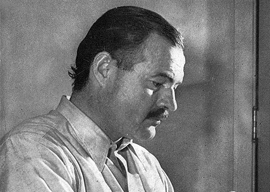
January 06, 2018

Ernest Hemingway
When the snow finally stopped, the sublime silence of the stars above made for dramatic viewing. Silhouetted against Alpine peaks, the starry nights—untainted by light pollution—seem made in Hollywood. I arrived in Gstaad one week before Christmas, determined to get in shape following the debauch of New York. The snow was coming down, the town was empty, the slopes were perfect, both my children were with us—then disaster: Wafic and Rosemary Said’s Christmas present arrived, and all good intentions went out the window. The present was a super, super-duper magnum of Haut Brion 1996, one that I refused to share with guests and downed only with the family. Actually I did share it with some very close buddies, who now ring me regularly asking for an introduction to Rosemary and Wafic.
It’s nice to have such generous friends, but it would be just as nice if I could exercise some self-control. The wine was so good I made a night of it, then a day of it, followed by another night of it. So what else is new? Well, Peter and Lara Livanos sent me a new book on Hemingway, the first biography of Papa by a woman, and I went for it not unlike the way I went for Wafic’s Haut Brion. And what a pleasant surprise it turned out to be. I expected the usual feminine crap slung against my hero Papa, but Mary Dearborn is not one of those obvious hags with a burning desire to punish men. She gives the greatest American writer his due and is fair about certain Hemingwayesque traits that in today’s world are unacceptable. I haven’t reached that part yet, but toward the end, Papa is being interviewed by an intrusive female reporter who was also the mistress of her editor at The New Yorker. When she asks him if he’s had all the women he ever wanted, Papa doesn’t flinch. “All of those I’ve wanted and a hell of a lot that I didn’t want, too.”
No Harvey he. Mary Dearborn discovered something the countless male biographers of Papa’s have missed: The real reason Hemingway went nuts at the end was caused by a horrible car crash after a riotous party Robert Capa threw for Hemingway in Lowndes Square back in 1944. Papa went through the windshield and in hospital was diagnosed as concussed. Typically, he was allowed to carry on drinking with his buddies in hospital and soon was allowed to leave and join the landing in Normandy. In fact, he had suffered a subdural hematoma that required drilling a hole in his skull to drain the blood. Despite constant headaches, trouble with handwriting, and loss of verbal memory, he was probably told by smiling British doctors to keep a stiff upper lip and get on with it. Instead of draining the brain and three months of minimum convalescence, he went off to war. Fifteen years later he blew his brains out for good. And now I’m not surprised. It was trauma that drove him nutty, nothing to do with what the crap amateur shrinks have thrown at him since his death by his own hand.
So the man who could write, “When we lived in Austria we would cut each other’s hair and let it grow to the same length. One was dark and the other dark red gold and in the dark in the night one would wake the other swinging the heavy dark or the heavy silken red gold across the others lips in the cold dark in the warmth of the bed. You could see your breath if there was moonlight,” could no longer keep it up. Peter Livanos has given me so many presents through the years, including a priceless samurai sword and a unique letter from the Mikado to King George II of Greece, but this Papa biography rescued me from one of the worst hangovers of all time. But then I read on and got very depressed. La Dearborn sticks it to Papa with all her female guiles working overtime. Of course he bragged like hell toward the end, but he was a manic-depressive with severe head wounds who managed to write The Old Man and the Sea and win the Nobel Prize a few years before going totally bonkers. Dearborn judges him as if he were normal. Unfair and rather bitchy, says Taki.
The Alps can be solitary and sublime, especially as dusk falls. On skis or on foot one meanders from one bucolic scene to the next, crossing raging rivers, skiing down glaciers, sliding along the tops of ridges, all of these wonders coming to an end once the new rich arrive and install themselves in the pretty village. At times I wonder if some of them have even heard of Switzerland or have noticed the snow. My son and his cousin Albert Thurn und Taxis—they both have Schoenburg mothers—were having a cigarette at the Palace Hotel and were approached by a Gulf camel driver, who asked them if they were Tunisian. Two Germanic-looking young men, and this creep asks them if they came from Tunis. It got worse when my son went to Mick Flick’s party for Gloria Thurn und Taxis’ exhibition of her paintings, which includes a wonderful portrait of yours truly, and was seated next to a German lady who asked him what he thought of Art Basel. “It’s an invention by smart hustlers to sell crap to dumb rich people,” said John Taki. She got up and left in a huff. Apparently Art Basel was her husband’s invention. Oh well, if I run into her and I have some Haut Brion left, I will give her some of Wafic’s magic and she’ll forget Art Basel and probably also her hubby. Happy New Year!